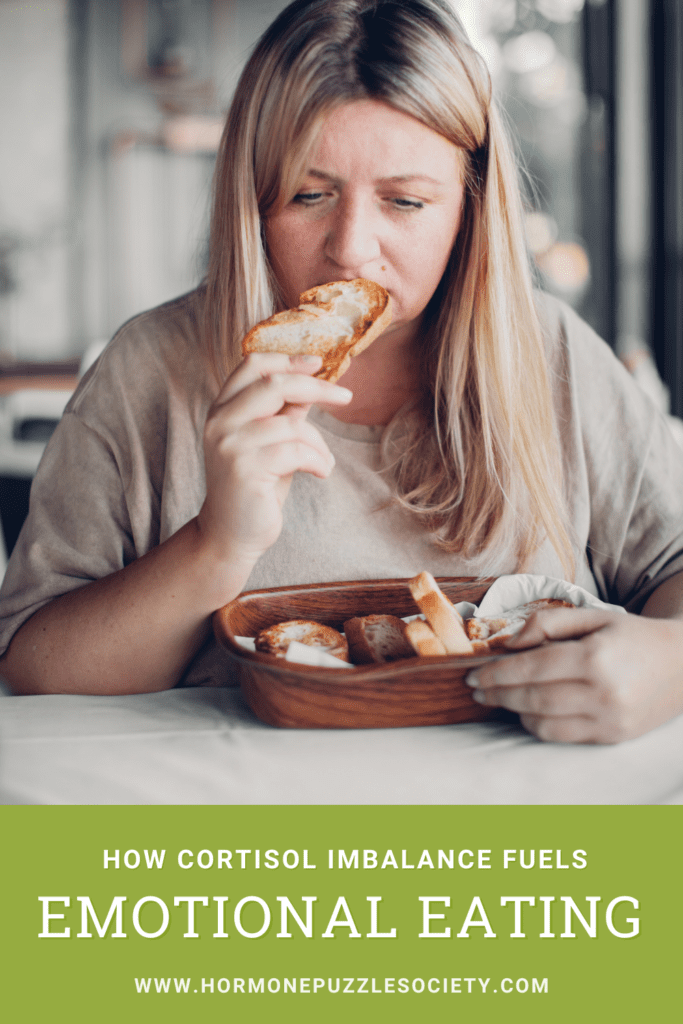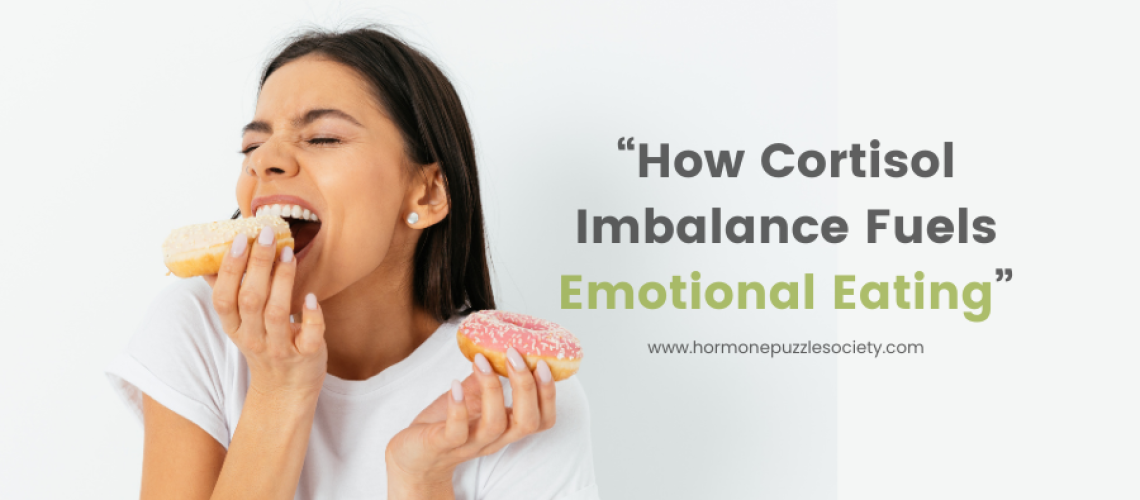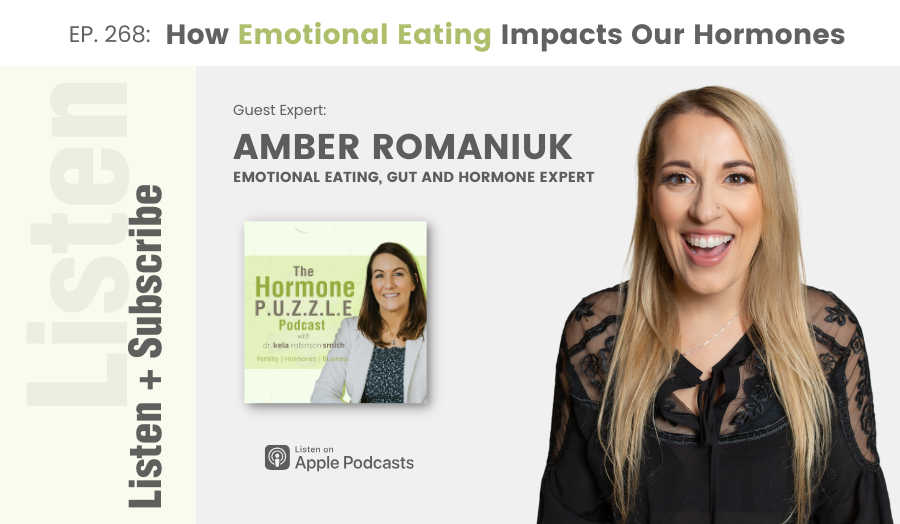Written by Guest Blogger: Amber Romaniuk, an Emotional Eating, Digestive and Hormone Expert.
One of the biggest things I learned on my journey to overcoming food addiction, emotional eating and self-sabotage with food, was that the more I focused on weight-loss, the more weight I gained.
Why? Well I was putting a lot of stress on my body with my thoughts, emotions, self-talk and of course the way I was behaving with food.
When we are constantly in a negative mindset, saying mean things to our bodies, putting ourselves down and telling ourselves we will never look good enough or can’t be happy until we lose weight, we end up in this place where we are constantly in a STRESS fight or flight response.
And the feelings can be really uncomfortable to feel, so then we start using food to soothe, numb, distract or check out from what we are feeling.
Both this heightened state of fight and flight and the emotional eating fuel inflammation, hormone imbalances and an overwhelmed nervous system. You feel more bloated, gassy and in pain. This all makes the body not feel safe and makes it easier to gain more weight. Or put on “protection” as I like to call it.
You see the body hangs onto protection when she doesn’t feel safe, and there are many different

emotional, energetic and physical reasons we can hang onto this weight.
When we try to FORCE the body to lose weight with restriction, too much exercise, or thinking buying smaller clothing will motivate us to be more mindful with food, we often overwhelm our system, and can only last following the rigid diet for so long before we get triggered and emotionally eat again.
And what is emotional eating?
Any reason for eating other than physical nourishment. You can eat mindlessly because you are bored, tired, sad, overwhelmed, feeling insecure in your body, unhappy with the number on the scale, nervous about the world, needing to grasp for control and so many other reasons.
Even hormone imbalances can fuel emotional eating. How?! Well let’s look at cortisol specifically. Cortisol is the stress hormone and when it spikes for long periods of time, we can end up feeling more fatigue, more brain fog, more irregular blood sugar and increased appetite levels. We often have increased cravings for refined sugar, salt and carbs when we have elevated cortisol. All of these things make it easier to want to give into emotional eating or binges.
And what creates this high cortisol? Many things including emotional eating, binge eating, over exercise, too much caffeine, overbooked schedules, people pleasing, diet/binge cycles, constant stress, poor sleep, negative self-talk, poor gut health and more.
What is interesting that I find is at the ROOT of most of the women’s struggles with their physical and emotional health is there a level of unworthiness they are feeling. They don’t feel good enough because they have either tied their worth to the way they look or how much they weigh, or to how much they do. And if they aren’t doing enough then they don’t feel enough.
This unworthiness has been programmed into us through our upbringing, how our families and parents treated us, Hollywood, media, all the poor body image influence imprinted in our subconscious minds and this constant programming that to be happy you have to lose weight.
What is so powerful about being willing to go deeper than just trying another diet or weight-loss plan is that when you truly address the roots of your unworthiness and fill the void…when you address the roots of your emotional eating triggers, your hormone imbalances, your weight-loss blocks and beyond, you learn SO much about yourself you never would have if you tried another quick fix.
Be willing to take the time to go on a true healing journey so your body, who is your guide and teacher can help you learn to listen to her, to become more attuned. To build awareness with your symptoms and what has created them and steps to take to resolve them. To understand your emotional eating triggers and learn to work through them without food.
So where to start?
- Acknowledge honestly where you are at and have compassion for yourself.
- Start small and pick 1-2 things to work on. Is it mindfully eating meals? Starting to journal out your emotional eating triggers or perhaps getting support to work on your mindset and nervous system.
- Start a self-care practice to help you introduce healthy ways to cope with stress and your life. Even starting with 10-15 minutes 3-4 days a week and growing it from there will help you feel more calm and at peace and prevent reaching for the donut or the chips again.
- Have powerful resources like blogs and podcasts to help assist you and plant seeds.
- Starting saying yes to yourself a little bit more and no to things you really are a no to. Setting these healthy boundaries will help you feel more confident, and open up a bit more time for you.
Guest Blogger,
Amber Romaniuk

Amber Romaniuk is an Emotional Eating, Digestive and Hormone Expert who helps high achieving women create a level of body confidence, intuition and optimal health through powerful mindset healing, self-care and overcoming self-sabotage with food. She does this through addressing the key negative thoughts, patterns and limiting beliefs that keep women stuck in the same behaviors for years and decades that they haven’t been able to break. Her podcast “The No Sugarcoating Podcast” has over a million downloads, over 400 episodes and is listened to in over 88 countries.
Amber overcame her own emotional eating after gaining and losing more than 1000 lbs and spending over $50,000 on binge foods and spending 5 years balancing her hormones, digestion. She also dismantled her deep limiting beliefs and behaviors keeping her stuck in the same looping patterns. Now she helps others achieve the biggest healing miracles of Body Freedom™ so they have the confidence and health to create amazing lives.
P.S. Catch Amber’s interview in this week’s episode of The Hormone P.U.Z.Z.L.E Podcast – How Emotional Eating Impacts Our Hormones. You can also find the episode on this podcast page as well as Spotify, and Stitcher. Don’t forget to subscribe, follow, and write us a review on Apple Podcast (if you LOVE it).


